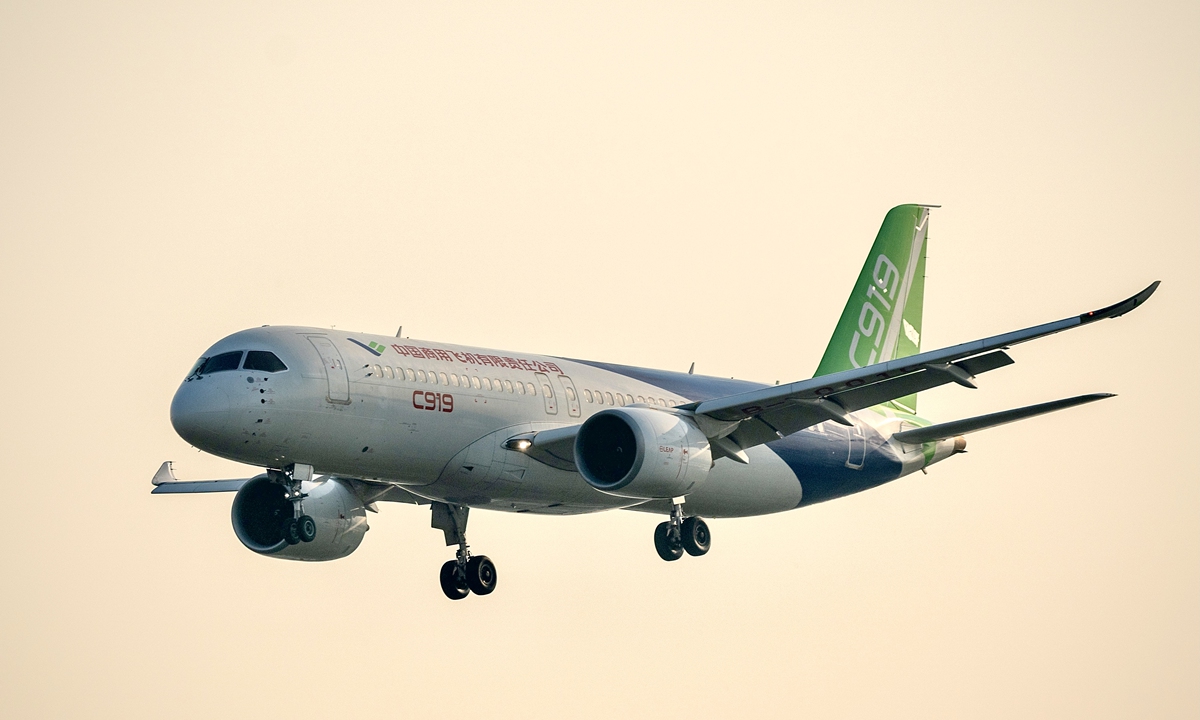China’s C919 jet completes all test flights before getting airworthiness certificate from CAAC
Move marks milestone in rapid development of first homegrown jet

C919 Photo: VCG
The Commercial Aircraft Corp of China (COMAC) said on Monday that the domestically produced C919 jet has completed all the test flights needed to obtain an airworthiness certificate from the Civil Aviation Administration of China (CAAC), marking another milestone in the rapid development of China's first homegrown passenger jet.
The producer made the announcement on its official WeChat account, which also contained an image of the plane and Chinese characters that read "congratulating C919 for completing all test flights before obtaining a certificate."
On July 23, COMAC said that its C919 jet was nearing certification as its test planes had completed all required trial flights.
There are three certificates required for the delivery of an aircraft in China. One is a type certificate, which indicates that the model design of the aircraft meets requirements; the second is a production certification, which indicates that the manufacturing of the aircraft meets national standards; the third is an individual aircraft certificate, indicating that each plane delivered to airlines complies with requirements, according to market watchers. These are all given by the CAAC.
The announcement confirms that COMAC has submitted the test results to CAAC and is waiting for approval of a CAAC type certificate, according to Lin Zhijie, an independent market watcher.
After COMAC gets the type certificate, the C919 plane is likely to receive the other two certificates in a short time, Lin said on Monday.
Market watchers said that obtaining the three certificates means that the plane is certified to fly, a prerequisite for entering commercial flight.
Wang Ya'nan, chief editor of Beijing-based Aerospace Knowledge magazine, told the Global Times in an earlier interview that after obtaining the airworthiness certificate, COMAC is expected to conduct demonstration flights on commercial routes and provide technical training for pilots and relevant personnel, which may take six to 12 months.
"Ideally, the C919 is expected to be put into commercial operation in 2023 if everything goes smoothly," Wang said.
Since it was first approved in 2006, the C919 is widely believed to aim to challenge the Airbus-Boeing duopoly in certain segment of the massive civil aviation industry. However, market watchers said that it's too early to say if a new plane can challenge the Airbus-Boeing duopoly.
"Our current job is to build the plane, and make it fly safely and reliably," Lin said, adding it will take about 20 years to see if the plane can compete with Airbus and Boeing.
Market observers said that there are two advantages for C919 - one is price, and the second is after-sale services. The aircraft's price tag will be lower than that of comparable Boeing and Airbus aircraft, and it will be exempt from import duties. Also, the whole production and service teams will be based within China, which will provide convenience to Chinese airlines.
The C919, China's first self-developed trunk jetliner, is fitted with 158-168 seats with a range of 4,075-5,555 kilometers. The plane conducted a successful maiden flight in 2017.
In March 2021, COMAC signed a contract with China Eastern Airlines for five planes. The new planes will be used on routes between Shanghai and Beijing, Guangzhou, Shenzhen and Chengdu, according to the airline.
To date, COMAC has received 815 orders for the C919 from 28 customers worldwide.
Boeing and China have an enduring partnership of more than 45 years. More than 50 percent of all commercial jets operating in China now are Boeing aircraft, and more than 10,000 Boeing aircraft currently fly around the world using Chinese-made components and assemblies, according to the official website of Boeing.
Airbus told the Global Times earlier that China is the largest single-country market for Airbus' commercial aircraft. Deliveries to the Chinese market last year represented over 20 percent of Airbus' total deliveries worldwide.


